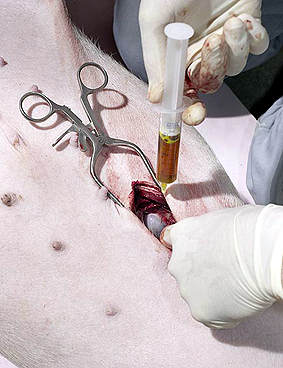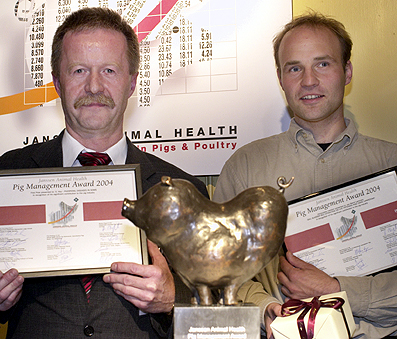 |
| Second prize for new examination technique: bile extracted from living pigs. |
First prize for best paper
goes to German researcher
Professor Steffen Hoy demonstrates that certain diseases in sows have much wider effects than previously thought / Second prize also awarded to a German for new examination method
(IPVS) – A German scientist has been awarded a prize by a private pharmaceutical company for the best paper at the 18th world congress of pig veterinarians in Hamburg. Professor Steffen Hoy from Giessen discovered that certain diseases in sows have much wider effects than previously thought. If a sow’s udder or uterus becomes infected or cannot provide enough milk, these diseases would also occur during subsequent production cycles, said Hoy during the award ceremony. This conclusion is new, he continued, and is particularly significant because these diseases are infectious and should be prevented in the interests of both the pigs and the pig breeders and farmers.
Diseases of the udder, uterus and milk production before, during and after farrowing are termed puerperal diseases. These diseases afflict sows and impair growth both in the sow and her piglets. In turn, restricted growth and the treatment of the diseases mean extra costs in the production of pigs.
 |
| Award for innovation - Prof. Steffen Hoy (left) and Jan-Bernd Lammers. |
Hoy also investigated the factors that can prevent or reduce the incidence of such diseases, including improved ventilation in pig housing – particularly the avoidance of draughts – and specially adapted housing systems.
The second prize went to Jan-Bernd Lammers who has developed a new method of examining pig bile. Only the bile of dead pigs used to be examined previously – and the results were not sufficiently reliable. The young researcher has developed a method of extracting bile from living pigs, which involves opening the abdomen for the extraction and closing it again afterwards. This procedure is said to be considerably less intrusive than a human appendix operation. The advantage of this method is that both an optimal examination time can be selected and, in contrast to the examination on dead pigs, no commingling of substances occurs. This provides more reliable results.
The prize was awarded by the Belgian pharmaceutical company Janssen Animal Health for the first time. The company had assembled a jury of nine scientists for the purpose. The scientists only evaluated papers with a high degree of practical relevance. A special series of presentations (Practitioners Line) was set up for the first time especially for such papers at the 18th world congress of pig veterinarians.
Both scientists will be presenting their papers at the conference tomorrow (Wednesday).
|